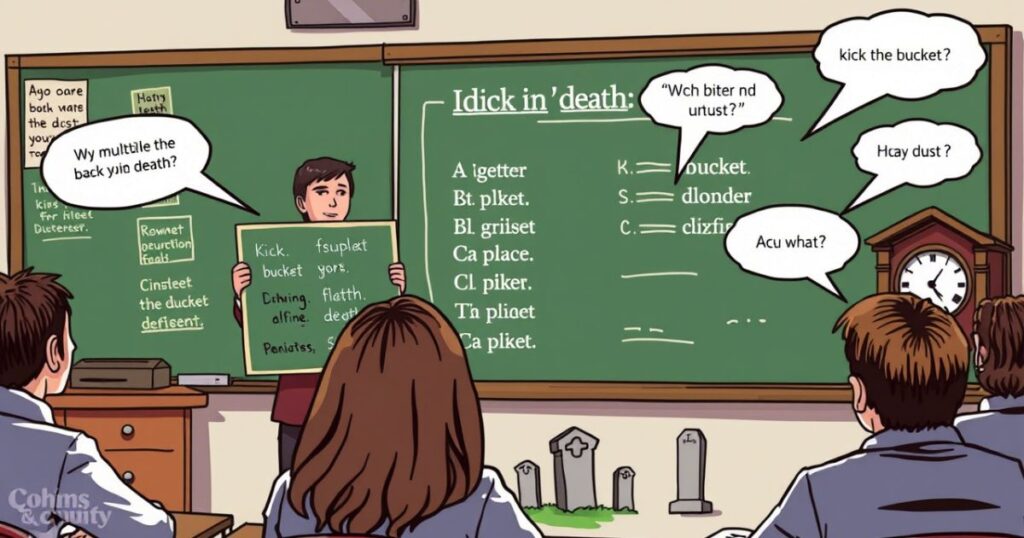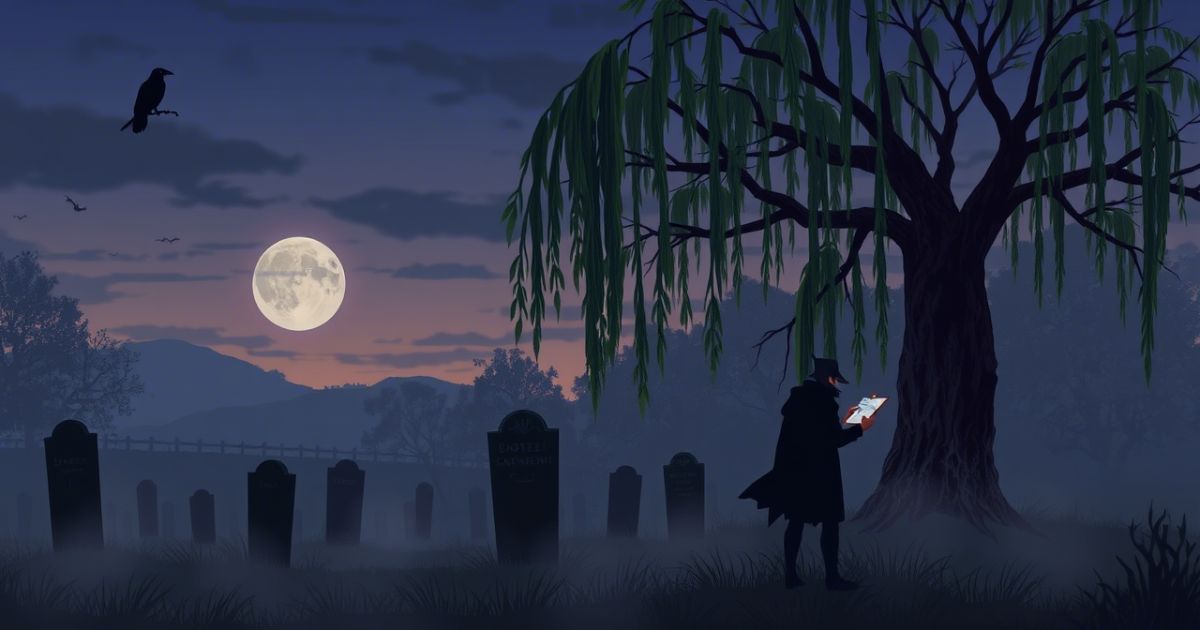Idioms for death often provide a softer, symbolic, or even humorous way to talk about a difficult topic. These expressions appear in literature, conversation, and pop culture, allowing people to address mortality with grace, wit, or respect.
From poetic euphemisms to dark humor, these idioms reflect cultural attitudes and human emotions surrounding the end of life. Here are 45 idioms, what they mean, how they’re used, and other ways to express the same idea.
1. Kick the Bucket
Meaning: To die, usually used informally or humorously.
In a Sentence: Grandpa kicked the bucket peacefully in his sleep last night.
Other Ways to Say: Pass away, bite the dust, meet one’s maker
2. Bite the Dust
Meaning: To die, often suddenly or violently; also used metaphorically for failure.
In a Sentence: Another soldier bit the dust during the final battle.
Other Ways to Say: Fall in battle, perish, go down
3. Meet One’s Maker
Meaning: To die and supposedly come face to face with God or a higher power.
In a Sentence: The outlaw finally met his maker after a long manhunt.
Other Ways to Say: Depart this life, rest in peace, go to glory
4. Pass Away
Meaning: A gentle, respectful way to say someone has died.
In a Sentence: Her grandmother passed away at the age of 98.
Other Ways to Say: Rest in peace, be laid to rest, succumb
5. Give Up the Ghost
Meaning: To die, especially when referring to the body ceasing to function.
In a Sentence: The old man gave up the ghost just before dawn.
Other Ways to Say: Draw one’s last breath, pass on, expire
6. Push Up Daisies
Meaning: A humorous way of saying someone is buried underground and growing flowers.
In a Sentence: Someday we’ll all be pushing up daisies.
Other Ways to Say: Be six feet under, take a dirt nap, rest in peace
7. Cross the Rainbow Bridge
Meaning: Often used when a beloved pet dies, implying they’ve moved on to a peaceful afterlife.
In a Sentence: Our dog Max crossed the Rainbow Bridge last night.
Other Ways to Say: Go to pet heaven, be in a better place, move on
8. Be Six Feet Under
Meaning: Dead and buried; a literal reference to grave depth.
In a Sentence: He’ll be six feet under if he keeps messing with the wrong crowd.
Other Ways to Say: Laid to rest, interred, pushing up daisies
9. Cash In One’s Chips
Meaning: To die, originating from gambling slang about ending a game.
In a Sentence: After a long illness, he finally cashed in his chips.
Other Ways to Say: Kick the bucket, check out, buy the farm
10. Buy the Farm
Meaning: To die, especially in military contexts or in accidents.
In a Sentence: He bought the farm when his plane went down.
Other Ways to Say: Perish, meet a tragic end, fall in action
11. Check Out
Meaning: To die or depart from life, like checking out of a hotel.
In a Sentence: She checked out peacefully with her family by her side.
Other Ways to Say: Pass on, slip away, call it a day
12. Call It a Day
Meaning: A soft metaphor for death, implying the end of life’s work.
In a Sentence: After 90 rich years, he finally called it a day.
Other Ways to Say: Rest in peace, lay down arms, finish the race
13. Rest in Peace
Meaning: A formal and respectful way to acknowledge death and wish peace in the afterlife.
In a Sentence: May she rest in peace after such a hard life.
Other Ways to Say: Eternal rest, be at peace, laid to rest
14. Depart This Life
Meaning: A poetic and formal way of expressing death.
In a Sentence: He departed this life surrounded by love.
Other Ways to Say: Cross over, pass on, leave this world
15. Go to a Better Place
Meaning: A comforting way to suggest the deceased is in a peaceful afterlife.
In a Sentence: She’s gone to a better place now.
Other Ways to Say: Find peace, be in heaven, rest easy
16. Join the Choir Invisible
Meaning: An old poetic idiom meaning to die and become one with eternity.
In a Sentence: He’s joined the choir invisible, as the saying goes.
Other Ways to Say: Pass on, be among the angels, become eternal
17. Take a Dirt Nap
Meaning: Slang for being dead and buried.
In a Sentence: That mobster took a dirt nap after the hit.
Other Ways to Say: Be six feet under, push up daisies, get whacked
18. Lose One’s Life
Meaning: A factual and often tragic way to say someone has died, especially in violent contexts.
In a Sentence: Many lost their lives in the earthquake.
Other Ways to Say: Perish, fall victim, pass away
19. Slip Away
Meaning: A gentle way to describe someone dying quietly or gradually.
In a Sentence: She slipped away in the middle of the night.
Other Ways to Say: Fade away, pass on, succumb
20. Draw One’s Last Breath
Meaning: A poetic and literal way of saying someone has died.
In a Sentence: The king drew his last breath just before sunrise.
Other Ways to Say: Exhale forever, breathe one’s last, expire
21. Expire
Meaning: A clinical or technical term for dying.
In a Sentence: The patient expired on the operating table.
Other Ways to Say: Pass away, cease to live, flatline
22. Flatline
Meaning: To die, especially in medical or hospital settings.
In a Sentence: The heart monitor beeped once more and then flatlined.
Other Ways to Say: Code blue, expire, be declared dead
23. Cease to Be
Meaning: A philosophical or dramatic expression meaning to stop living.
In a Sentence: When the light went out, he ceased to be.
Other Ways to Say: No longer exist, be gone, end
24. Be No More
Meaning: A poetic or dramatic way to say someone has died or disappeared.
In a Sentence: After the storm, the village was no more.
Other Ways to Say: Vanish, cease to be, be gone
25. Cross Over
Meaning: A spiritual way of saying someone has transitioned from life to the afterlife.
In a Sentence: He crossed over peacefully, surrounded by prayer.
Other Ways to Say: Move on, pass over, transition
26. Take the Long Sleep
Meaning: To die, especially in a peaceful or final way.
In a Sentence: After years of illness, he took the long sleep.
Other Ways to Say: Rest eternally, be at rest, go to sleep forever
27. Walk into the Light
Meaning: To pass into the afterlife, often peacefully or spiritually.
In a Sentence: They said she walked into the light with a smile on her face.
Other Ways to Say: Cross over, find peace, ascend
28. Ride into the Sunset
Meaning: To die or disappear, often used for heroes or endings.
In a Sentence: The cowboy rode into the sunset and was never seen again.
Other Ways to Say: Fade away, bow out, move on
29. Hand in One’s Dinner Pail
Meaning: To die, especially in a working-class or old-fashioned context.
In a Sentence: After decades in the factory, old Joe handed in his dinner pail.
Other Ways to Say: Punch out for good, retire forever, check out
30. Be Called Home
Meaning: A religious euphemism for dying and going to heaven.
In a Sentence: The preacher said the Lord had called her home.
Other Ways to Say: Be taken, join the Lord, go to glory
31. Take the Final Bow
Meaning: To die or make a graceful exit from life, as in the end of a performance.
In a Sentence: The actor took his final bow last week after a long illness.
Other Ways to Say: Exit the stage, leave the show, curtain call
32. Catch the Last Train
Meaning: To die, especially symbolizing the journey to the afterlife.
In a Sentence: He caught the last train after saying goodbye to his family.
Other Ways to Say: Move on, depart, go on a final journey
33. Get Their Wings
Meaning: To die and become an angel or spirit.
In a Sentence: When she passed, they said she got her wings.
Other Ways to Say: Ascend, fly away, be with the angels
34. Clock Out
Meaning: To die, with connotations of time ending.
In a Sentence: The nurse said he clocked out around midnight.
Other Ways to Say: Punch out, expire, be done
35. Drop Off the Perch
Meaning: A humorous or colloquial way to say someone has died.
In a Sentence: He finally dropped off the perch after battling illness for years.
Other Ways to Say: Fall off the twig, croak, snuff it
36. Lay Down One’s Arms
Meaning: To die, often used in military or poetic contexts.
In a Sentence: The old soldier laid down his arms and closed his eyes.
Other Ways to Say: Rest in peace, fall, give up the fight
37. End One’s Watch
Meaning: To die, particularly in maritime or military settings.
In a Sentence: Captain Hayes ended his watch at sea, just as he’d wanted.
Other Ways to Say: Stand down, finish the duty, pass on
38. Go to Sleep with the Star
Meaning: A poetic way to describe death, often peaceful or romanticized.
In a Sentence: She went to sleep with the stars one quiet evening.
Other Ways to Say: Rest in peace, drift away, slumber forever
39. Dance with Death
Meaning: To die, especially following a close brush with danger.
In a Sentence: He danced with death too many times before it finally caught up.
Other Ways to Say: Flirt with fate, tempt death, meet one’s end
40. Step Off the Stage
Meaning: To die, especially when referring to public figures or performers.
In a Sentence: The politician stepped off the stage for the final time.
Other Ways to Say: Take the final bow, exit life, curtain call
41. Check Into the Great Beyond
Meaning: To die and move into the unknown afterlife.
In a Sentence: They said he checked into the great beyond last night.
Other Ways to Say: Enter the next life, pass over, leave the mortal coil
42. Sleep the Eternal Sleep
Meaning: A poetic way to describe death, implying peace.
In a Sentence: He now sleeps the eternal sleep under the oaks.
Other Ways to Say: Rest eternally, be at peace, lie in repose
43. Take the Final Voyage
Meaning: To die, using nautical imagery for life’s end.
In a Sentence: The sailor took his final voyage into the unknown.
Other Ways to Say: Set sail, depart this shore, cross the sea
44. Become Worm Food
Meaning: A darkly humorous way to say someone is buried and decomposing.
In a Sentence: He joked that he’d soon be worm food.
Other Ways to Say: Push up daisies, take a dirt nap, be six feet under
45. Get Reaped
Meaning: To die, often referencing the Grim Reaper.
In a Sentence: When the bell tolled, he got reaped.
Other Ways to Say: Be taken, meet death, fall
MCQs: Idioms for Death Quiz

1. What does the idiom “kick the bucket” mean?
A) To win a game
B) To die
C) To quit a job
D) To get injured
Answer: B) To die
2. Which idiom is often used for the peaceful passing of a beloved pet?
A) Be no more
B) Bite the dust
C) Cross the Rainbow Bridge
D) Push up daisies
Answer: C) Cross the Rainbow Bridge
3. “Buy the farm” originally came from what context?
A) Farming economy
B) Military/aviation
C) Real estate
D) Hospital care
Answer: B) Military/aviation
4. What does “give up the ghost” suggest?
A) Become a ghost
B) Stop fighting
C) Die, body ceasing to function
D) Leave a place suddenly
Answer: C) Die, body ceasing to function
5. Which idiom has a theatrical origin and means to die?
A) Clock out
B) Take the final bow
C) Drop off the perch
D) Get reaped
Answer: B) Take the final bow
6. What idiom implies someone has been buried underground?
A) Hand in one’s dinner pail
B) Be six feet under
C) Step off the stage
D) Get their wings
Answer: B) Be six feet under
7. Which of the following idioms is most poetic in tone?
A) Become worm food
B) Rest in peace
C) Sleep the eternal sleep
D) Take a dirt nap
Answer: C) Sleep the eternal sleep
8. “Catch the last train” is used to represent:
A) Missing a train
B) Leaving for vacation
C) Dying or departing life
D) Giving up on something
Answer: C) Dying or departing life
9. Which idiom refers to death with religious implication?
A) Walk into the light
B) Flatline
C) Cash in one’s chips
D) Fall off the twig
Answer: A) Walk into the light
10. What does it mean to “shuffle off this mortal coil”?
A) Retire from work
B) Be reborn
C) Die and escape worldly troubles
D) Leave your hometown
Answer: C) Die and escape worldly troubles
11. “Punch a one-way ticket” refers to:
A) Traveling for good
B) Committing to a plan
C) Dying with no return
D) Ending a relationship
Answer: C) Dying with no return
12. What idiom humorously means to be dead and decomposing underground?
A) Ride into the sunset
B) Be no more
C) Become worm food
D) Go to a better place
Answer: C) Become worm food
13. The phrase “end one’s watch” would most likely be heard in which context?
A) Theatre
B) Maritime or military
C) Medical field
D) Farming
Answer: B) Maritime or military
14. Which idiom refers to being buried and indirectly growing flowers?
A) Draw one’s last breath
B) Push up daisies
C) Hand in dinner pail
D) Call it a day
Answer: B) Push up daisies
15. What does “cross the great divide” symbolically refer to?
A) Climbing a mountain
B) Traveling abroad
C) Dying and entering the afterlife
D) Solving a conflict
Answer: C) Dying and entering the afterlife
Conclusion
Idioms for death offer creative, cultural, and emotional ways to talk about life’s inevitable end. They range from reverent and poetic to humorous and blunt. Through idioms, language softens the harshness of mortality. They reflect how we cope, grieve, and even laugh in the face of death. Understanding these expressions adds depth to our conversations and compassion to our communication. Whether comforting or comical, these idioms help us speak about death in a human, meaningful way.









